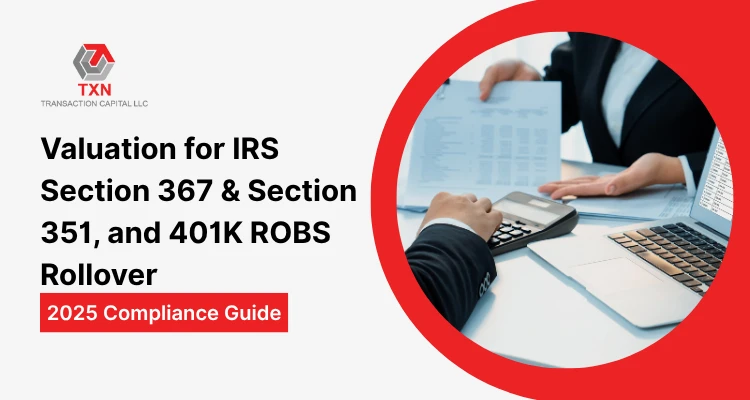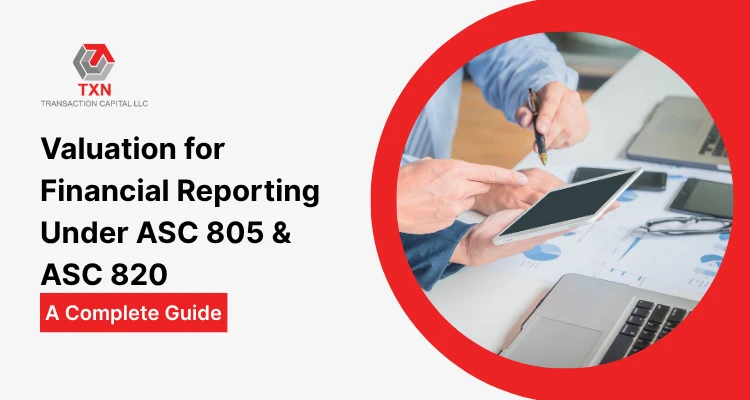Valuation for IRS Section 367 & Section 351, and 401K ROBS Rollover: 2025 Compliance Guide

Starting a business with retirement funds or transferring assets internationally? IRS-compliant valuations aren't optional—they're mandatory under Sections 367, 351, and 401(k) ROBS regulations. One misstep could trigger audits, penalties, or plan disqualification.
TXN Capital LLC has guided 1,500+ businesses through these complex valuation requirements with a 100% audit success rate. This comprehensive guide reveals exactly what triggers each valuation requirement and how to stay compliant in 2025.
What Triggers IRS Valuation Requirements for Business Transactions?
Three major IRS provisions require certified fair market valuations for business transactions:
Section 367 mandates valuations for outbound transfers of intellectual property or assets to foreign entities.
Section 351 requires valuations when incorporating property in exchange for corporate stock.
401(k) ROBS (Rollover as Business Startup) demands valuations when using retirement funds to capitalize new businesses.
Each provision serves different purposes but shares one critical requirement: independent, certified fair market value assessments that withstand IRS scrutiny.
How Does IRS Section 367 Apply to International Asset Transfers?
What Is Section 367 and When Does It Apply?
IRS Section 367(a) prevents U.S. taxpayers from avoiding capital gains taxes by transferring property to foreign corporations. The regulation applies whenever American individuals or entities contribute assets—particularly intellectual property—to overseas subsidiaries or affiliates.
Common Section 367 scenarios include:
- Tech startups establishing Singapore or Irish holding companies for IP ownership
- Delaware C-Corps spinning operational divisions to international affiliates
- Manufacturing companies transferring patents or trademarks to foreign entities
- Software developers contributing code repositories to offshore development teams
What Valuation Documentation Does Section 367 Require?
The IRS demands comprehensive fair market value appraisals for all transferred tangible and intangible assets. Required documentation includes:
IRS Form 926 filing with detailed asset descriptions and valuations Independent appraisal reports following USPAP standards Methodology documentation explaining valuation approaches (DCF, Relief-from-Royalty, Market Approach) Supporting financial analysis including cash flow projections and market comparisons
Real-world example:
A California SaaS company transfers its proprietary software platform and customer database to an Irish subsidiary. This transaction triggers Section 367 requirements.
When Does IRS Section 351 Require Business Valuations?
Understanding Section 351 Tax-Deferred Incorporations
Section 351 enables tax-free property transfers to corporations in exchange for stock ownership—provided transferors receive at least 80% control post-transaction. This provision commonly applies when entrepreneurs convert sole proprietorships or LLCs to C-Corporations, or when founders contribute pre-existing assets to newly formed entities.
Typical Section 351 triggers:
- Converting partnership or LLC structures to Delaware C-Corp status
- Founders contributing developed applications, websites, or IP to new corporations
- Consolidating scattered business assets under single corporate entities
- Pre-investment restructuring to optimize cap tables and equity distribution
Why Certified Valuations Are Critical for Section 351 Compliance
Accurate fair market valuations serve multiple compliance purposes:
Initial stock pricing based on contributed property values Cap table accuracy for future fundraising and equity compensation IRS audit protection through documented valuation methodologies.
409A valuation preparation for employee stock option programs.
Practical application: An app developer contributes mobile application source code, existing user base, and trademark assets to a newly incorporated Delaware C-Corp. Transaction Capital uses a Cost-to-Recreate method for code and a Market Multiple for the user list.
How Do 401(k) ROBS Transactions Work and Why Do They Need Valuations?
What Is a ROBS Rollover and How Does It Work?
Rollover as Business Startup (ROBS) transactions allow entrepreneurs to access retirement funds without triggering early withdrawal penalties or immediate tax obligations.
The process involves four sequential steps:
- C-Corporation formation meeting IRS structural requirements
- Qualified 401(k) plan establishment administered by the new corporation
- Retirement fund rollover from existing IRA or 401(k) accounts into the new plan
- Corporate stock purchase by the qualified plan using rolled-over funds
When Are ROBS Valuations Required?
Three critical timing requirements govern ROBS valuations:
- Initial investment stage: Fair market value assessment before the qualified plan purchases corporate stock
- Annual compliance updates: Refreshed valuations maintaining ERISA and IRS regulatory compliance
- Significant business events: New valuations for recapitalization, fundraising rounds, or ownership changes
Failure to maintain current, documented fair market values can result in plan disqualification, triggering immediate tax obligations and early withdrawal penalties on the entire investment amount.
What Are the Compliance Risks of Inadequate ROBS Valuations?
Missing or inadequate valuations create serious regulatory exposure:
- IRS plan disqualification treating the entire transaction as a prohibited transaction
- Immediate tax liability on the full rollover amount plus early withdrawal penalties
- ERISA fiduciary violations exposing plan sponsors to personal liability
- DOL audit triggers requiring extensive documentation and potential fines
Who Can Perform IRS-Compliant Business Valuations?
Required Professional Qualifications
Only properly credentialed professionals can perform IRS-compliant valuations:
- Accredited Business Valuators (ABV®) certified by the American Institute of CPAs
- Accredited Senior Appraisers (ASA®) credentialed by the American Society of Appraisers
- Certified Valuation Analysts (CVA®) certified by the National Association of Certified Valuators
- Independent specialists with demonstrable expertise in business valuation methodologies
Important limitation: General CPAs without specialized valuation certifications cannot perform Section 367, 351, or ROBS valuations under IRS guidelines.
Independence Requirements and Conflicts of Interest
All valuation professionals must maintain independence from the subject business and transaction participants.
Prohibited relationships include:
- Direct financial interests in the valued entity
- Family relationships with owners or key management
- Ongoing advisory roles creating potential conflicts
- Compensation arrangements tied to valuation outcomes
What Valuation Methods Are Accepted by the IRS?
Primary Valuation Approaches
Four main methodologies based on asset types and business characteristics:
1. Discounted Cash Flow (DCF) Analysis
Best for: Established businesses with predictable revenue streams and intellectual property generating ongoing income
DCF methodology projects future cash flows and discounts them to present value using risk-adjusted discount rates. This approach works particularly well for SaaS platforms, subscription businesses, and licensing arrangements.
2. Relief-from-Royalty Method
Best for: Software, branding, patents, and other intangible assets
This methodology calculates the present value of royalty payments the owner would avoid by owning rather than licensing the intangible asset. It's commonly used for technology IP, software platforms, and brand valuations.
3. Market Approach Analysis
Best for: Businesses with comparable public or private transaction data
Market methodology analyzes recent sales of similar companies or assets, adjusting for differences in size, growth, profitability, and risk factors. This approach provides strong support when sufficient comparable data exists.
4. Cost-to-Recreate Assessment
Best for: Early-stage technology companies and pre-revenue startups
Cost methodology calculates the expense required to recreate or replace the valued asset from scratch, including development time, expertise, and market positioning. It's particularly useful for startup IP and custom software development.
Required Documentation Standards
Every compliant valuation report must include:
- Specific valuation date and fair market value standard definition
- Detailed methodology explanations with supporting calculations
- Assumption documentation including growth rates, discount rates, and market conditions
- Sensitivity analysis showing value ranges under different scenarios
- Compliance checklists addressing IRS and DOL review requirements
Case Study: Integrated Section 367, 351, and ROBS Implementation
Complex Multi-Jurisdiction Transaction Structure
Background situation: Michael, a technology entrepreneur, developed a comprehensive SaaS platform while employed. After leaving his corporate position, he needed to:
- Transfer developed IP to a Singapore holding company for international tax optimization (Section 367)
- Fund U.S. operations using his accumulated 401(k) retirement savings (ROBS transaction)
- Consolidate business activities under a Delaware C-Corporation structure (Section 351)
Solution Implementation
Our integrated approach addressed all three regulatory requirements simultaneously:
- Intellectual Property Valuation: Relief-from-Royalty analysis for the SaaS platform, customer acquisition algorithms, and proprietary data processing methods
- ROBS Stock Appraisal: Cost-to-Recreate methodology for early-stage technology assets combined with DCF projections for revenue-generating components
- Section 351 Documentation: Comprehensive fair market value assessment supporting tax-deferred incorporation and initial equity distribution
Regulatory Approval and Business Outcomes
All three valuation reports received:
- Attorney approval for IRS Form 926 international transfer documentation
- CPA acceptance for ERISA qualified plan implementation
- Successful investor due diligence review for Series A fundraising preparation
The integrated approach saved Michael significant professional fees while ensuring comprehensive regulatory compliance across all jurisdictions and transaction types.
Best Practices for Maintaining Ongoing Compliance
Timing and Documentation Requirements
Establish regular valuation schedules aligned with regulatory requirements:
- Initial assessments before any asset transfer or stock issuance
- Annual updates maintaining current fair market values for ongoing compliance
- Event-triggered revaluations following fundraising, acquisitions, or significant business changes
Maintain comprehensive audit trails including methodology documentation, supporting calculations, and assumption justifications.
Internal Controls and Governance
Implement systematic compliance monitoring:
- Professional oversight ensuring all valuations meet credentialing requirements
- Independence verification confirming no conflicts of interest exist
- Documentation standards maintaining IRS and DOL audit-ready records
- Regulatory updates staying current with evolving compliance requirements
Why Choose TXN Capital LLC for IRS Valuation Requirements?
Professional Credentials and Industry Recognition
Our team maintains the industry's most respected certifications:
- ABV® (Accredited in Business Valuation): American Institute of CPAs
- ASA (Accredited Senior Appraiser): American Society of Appraisers
- MRICS: Royal Institution of Chartered Surveyors
- CVA® (Certified Valuation Analyst): National Association of Certified Valuators
Protect your business with IRS-compliant valuations that withstand audit scrutiny. TXN Capital LLC delivers certified Section 367, 351, and ROBS valuations with 3-5 day turnaround times and 100% regulatory compliance.

